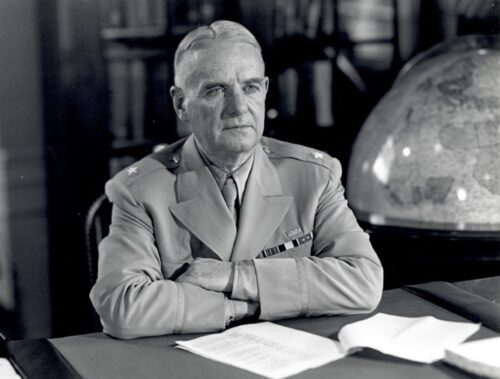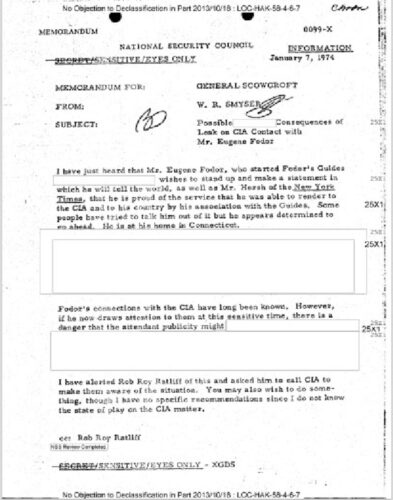Monument “Thank you America” to remember freedom from Nazis by US Army in May 1945. This monument takes place at important Pilsner crossing “U Práce”. Photo: Ondrej.konicek. CC BY-SA 3.0.
All warfare is based on deception.” — Sun Tzu
Eugene Fodor was a travel guide pioneer. Fodor’s was the first company to publish annually updated guidebooks for middle-class travelers who wanted to explore the world and interact with different cultures. His guidebooks were innovative and influential, covering not only the typical sights and attractions, but also the social and political aspects of the countries he visited. He wrote with a witty and engaging style, encouraging his readers to be curious and adventurous. He was also a naturalized American who served in the Office of Strategic Services (OSS), the precursor to the CIA, during World War II, and later had connections to the Central Intelligence Agency (CIA).
Fodor was born in 1905 He grew up in a city called Léva, which was part of Hungary at that time, but is now known as Levice and belongs to Slovakia. The city was under the control of Austria-Hungary when he was born. Fodor pursued his education in France, where he studied political economics at two prestigious universities: the Sorbonne and the University of Grenoble. He also worked as an interpreter for a French shipping company. He traveled extensively in Europe, Africa and Asia, learning six languages along the way. He settled in London in 1934 and started his own travel agency.
He had a passion for travel, and he noticed that the travel guides available in his time were not very interesting or engaging. He wanted to write a different kind of travel book, one that would entertain and inform the readers. He wrote On the Continent—The Entertaining Travel Annual, which was a guide to Europe that included anecdotes, humor and cultural insights. The book was published in 1936 by Francis Aldor, Aldor Publications, London, and it was well-received by the public. It was different from other travel guides at that time, which were mostly directories of hotels and attractions. It was also reprinted as an e-book by Random House in 2011.
When the war broke out, Fodor moved to New York. He joined the US Army1942 and became a naturalized US citizen soon after. His language skills drew the attention of the Office of Strategic Services (OSS). The OSS was formed as an agency of the Joint Chiefs of Staff to coordinate espionage activities behind enemy lines for all branches of the United States Armed Forces.

Fodor was recruited for a special assignment by Colonel William Paley (the founder of CBS) and General William “Wild Bill” Donovan, the head of the OSS. The mission of Fodor’s team, called the First Mobile Radio Broadcasting Company, was to spread false information and lower the enemy’s morale through radio, leaflets and loudspeakers on the front. In 1945, Fodor, led a team of OSS operatives to assist General Patton’s army in freeing the strategic city of Plzeň (Pilsen), Czechoslovakia from the Nazi occupation. The liberation of Plzeň by Patton’s Third Army was a fact that was suppressed by the communists during the country’s communist era. After the war ended, Fodor spent a year in Prague. While there, he fell in love and married Vlasta, a Czech woman.
His spy status was kept a secret for a long time, until E. Howard Hunt, a former CIA officer and a co-conspirator in the Watergate scandal, revealed it in the late 1970s. According to Hunt, Fodor had worked as a spy in Austria and continued in intelligence for 12 to 15 years during the Cold War era. Hunt did not disclose the details of Fodor’s missions or the agency he worked for. The New York Times reported that CIA money was used to underwrite Fodor’s travel guides. Fodor denied that he was an undercover agent and that the CIA helped to found and fund his organization.

He founded his own travel guide company, Fodor’s Modern Guides, in Paris, France, in 1949. He created Fodor Modern Guides, which were innovative and comprehensive guides that covered various destinations around the world. He moved his company headquarters to Connecticut in 1964, where he continued to produce and publish his guides. He lived there until his death in 1991.
Today, Fodor’s is one of the leading travel guide publishers in the world, with over 8,000 destinations covered across more than 300 guidebooks and a website that attracts millions of visitors every month. Fodor’s Travel also publishes an annual “Go List” of recommended places to visit and a “No List” of places that tourists may want to avoid due to environmental or ethical concerns.
Source
Fodor’s
Fodors.com
*The views and opinions expressed on this website are solely those of the original authors and contributors. These views and opinions do not necessarily represent those of Spotter Up Magazine, the administrative staff, and/or any/all contributors to this site.

